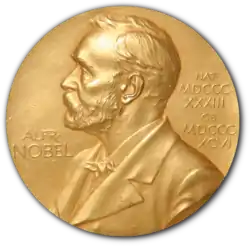Jerome Isaac Friedman
Jerome Isaac Friedman (born March 28, 1930) is an American physicist. He is Institute Professor and Professor of Physics, Emeritus, at the Massachusetts Institute of Technology. He won the 1990 Nobel Prize in Physics along with Henry Kendall and Richard Taylor, for work showing an internal structure for protons later known to be quarks. Friedman sits on the Board of Sponsors of the Bulletin of the Atomic Scientists.
Jerome Isaac Friedman | |
|---|---|
 Jerry Friedman in June 2016, Valencia, Spain | |
| Born | March 28, 1930 |
| Nationality | United States |
| Alma mater | University of Chicago |
| Known for | Experimental proof of quarks |
| Spouse(s) | Tania Letetsky-Baranovsky (m. 1956; 4 children)[1] |
| Awards | President's Medal of the IOP (2000) Nobel Prize in Physics (1990) |
| Scientific career | |
| Fields | Physics |
| Institutions | MIT |
| Doctoral advisor | Enrico Fermi |
Life and career
Born in Chicago, Illinois to Lillian (née Warsaw) and Selig Friedman, a sewing machine salesman, Friedman's Jewish[2] parents emigrated to the U.S. from Russia. Jerome Friedman excelled in art but became interested in physics after reading a book on relativity written by Albert Einstein. He turned down a scholarship to the Art Institute of Chicago in order to study physics at the University of Chicago. Whilst there he worked under Enrico Fermi, and eventually received his Ph.D in physics in 1956. In 1960 he joined the physics faculty of the Massachusetts Institute of Technology.
In 1968-69, commuting between MIT and California, he conducted experiments with Henry W. Kendall and Richard E. Taylor at the Stanford Linear Accelerator Center which gave the first experimental evidence that protons had an internal structure, later known to be quarks. For this, Friedman, Kendall and Taylor shared the 1990 Nobel Prize in Physics. He is an Institute Professor at the Massachusetts Institute of Technology. Friedman is also a member of the Board of Sponsors of the Bulletin of the Atomic Scientists.[3]
In 2003 he was one of 22 Nobel Laureates who signed the Humanist Manifesto.[4] He is an atheist.[5]
Friedman is one of the 20 American recipients of the Nobel Prize in Physics to sign a letter addressed to President George W. Bush in May of 2008, urging him to "reverse the damage done to basic science research in the Fiscal Year 2008 Omnibus Appropriations Bill" by requesting additional emergency funding for the Department of Energy’s Office of Science, the National Science Foundation, and the National Institute of Standards and Technology.[6]
In 2008, Friedman received an honorary Ph.D from the University of Belgrade. He is an honorary professor at the University of Belgrade's Faculty of Physics and the Faculty's institutes: Institute of Physics, Institute of Physics, Zemun and Vinca Nuclear Institute.
Publications
- Friedman, J. I., Kendall, H. W., et al. "Experimental Search for a Heavy Electron", Massachusetts Institute of Technology, United States Department of Energy (through predecessor agency the Atomic Energy Commission) September 1967.
- Friedman, J. I. "Deep Inelastic Electron Scattering: Experimental", Massachusetts Institute of Technology, United States Department of Energy (through predecessor agency the Atomic Energy Commission) October 1971.
Honours
 Grand Cordon of the Order of the Rising Sun (2016)
Grand Cordon of the Order of the Rising Sun (2016)- Golden Plate Award of the American Academy of Achievement (1991)[7]
See also
References
- Nobel Prize winners: Supplement, 1987-1991 : an H.W. Wilson biographical dictionary, Volume 2. H.W. Wilson Co. 1992. ISBN 9780824208349. Retrieved June 3, 2014.
- "Jewish Laureates of Nobel Prize in Physics". Jewish Laureates of Nobel Prize in Physics. Israel Science and Technology Homepage. 2013. Retrieved June 3, 2014.
- "Board of Sponsors". Board of Sponsors. Bulletin of the Atomic Scientists. 2014. Retrieved June 4, 2014.
- "Notable Signers". Humanism and its Aspirations. American Humanist Association. Archived from the original on October 5, 2012. Retrieved October 2, 2012.
- "Archived copy". Archived from the original on 2017-12-07. Retrieved 2016-07-09.CS1 maint: archived copy as title (link)
- "A Letter from America's Physics Nobel Laureates" (PDF).
- "Golden Plate Awardees of the American Academy of Achievement". www.achievement.org. American Academy of Achievement.
External links
| Wikimedia Commons has media related to Jerome Isaac Friedman. |
| Wikiquote has quotations related to: Jerome Isaac Friedman |
- Jerome Isaac Friedman on Nobelprize.org
 including the Nobel Lecture, December 8, 1990 Deep Inelastic Scattering: Comparisons with the Quark Model
including the Nobel Lecture, December 8, 1990 Deep Inelastic Scattering: Comparisons with the Quark Model - Friedman page at MIT
- Jerome Friedman Playlist Appearance on WMBR's Dinnertime Sampler radio show January 5, 2005
- Friedman Explains Role of Quarks in Killian Talk, Massachusetts Institute of Technology, (April 1, 2001)
- Will Innovation Flourish in the Future? Opinion by Jerome Friedman, American Institute of Physics
